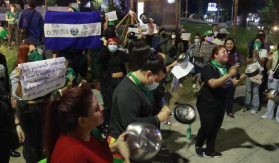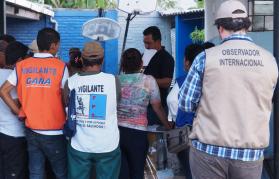LASC Position on the Merida Initiative
As Congress enters the final stages to approve the MeridaInitiative, an aid package to Mexico and Central America that seeks to furthermilitarize the region under the guise of the U.S.s war on drugs/war onterror, we find manifold reasons to stand in opposition:
1) Money for Central America through the Merida Initiativewould mark a significant increase in funding for military/police equipment andtraining in the region at a time when the need is for anti-poverty andcrime-prevention programs.
TheMerida Initiative, also known as Plan Mexico, builds on the troubling model ofPlan Colombia, which has poured billions of dollars into a failed militaryapproach to combating drugs while doing little to address rural poverty andurban unemployment. Central America has already become a satellite for U.S.military and police training in Latin America, despite the poor human rightsrecords of some governments in the region. With the opening of the International Law Enforcement Academy (ILEA) in2005, El Salvadoralready the second largest recipient of military training inthe regionbecame the hub of police training. The ILEA has the capacity totrain 1500 students per year, more than the current Western HemisphereInstitute for Security and Cooperation, also known as the SOA. U.S. officialsrefuse to acknowledge the corruption, misconduct and human rights violationscommitted by the Salvadoran police. Tothe contrary, the Merida Initiative now proposes to further support ILEA andfurther equip those police. Meanwhile,the Initiative wholly ignores the root problems that continue to compelregional involvement in drug traffickingpoverty and unemployment.
2) The Merida Initiative would further threaten humanrights by supporting repression of the rights to free speech and protest. The money from the U.S. would be an openinvitation for the Mexican and Central American governments to continue usingiron fist and anti-terrorism laws to crack down on legitimate socialmovements.
Over the last decade, Mexican police and military personnel haverepeatedly committed human rights violations in attempt to silence civildissent. Taking the most recentexample, in 2006 security forces responded to civil society protest in Oaxacawith hundreds of arbitrary detentions, acts of torture, and over 20assassinations. Numerous Mexican and internationalhuman rights organizations have expressed concern that Merida Initiative aidfor Mexico's military and police constitutes a recipe for unchecked humanrights violations.
Meanwhile, an anti-terrorism lawpassed by the Salvadoran legislature in 2006 uses language that, like the IronFist laws implemented in other Latin American countries, is very vague, leavingthem open to a wide variety of repressive applications. The Salvadoran government has already usedthese laws to further criminalize protest tactics commonly used by socialmovements. The US Ambassador to ElSalvador has expressed explicit support for police crackdowns, condoning theuse of police force in protecting US trade interests. Through funding the ILEA in addition to other police trainingprograms in Central America and the Caribbean the Merida Initiative wouldlegitimize and justify such crackdowns . Vague human rights provisions in the bill would not change this reality.
Finally, there is evidence that thecountries receiving aid from the Merida Initiative are already working tomilitarize their police forces. The separation betweenpolice and military in El Salvador and Guatemala, the top two Central Americanrecipients of Merida Initiative aid, has declined dramatically in the yearssince Peace Accords led to the demilitarization of police in thosecountries. There has also been a resurgence of death squad-style murders, some linked to the police,in both Guatemala and El Salvador.
3) The Initiative would not effectively combatdrug-trafficking.
Military interdiction efforts have a "balloon" effect. In Colombia, U.S. military efforts to stop coca production and trafficking inkey locations have simply shifted production and trafficking to new locations,causing the number of coca-producing states to jump from 8 to 24 over thecourse of Plan Colombia. The MeridaInitiative would likely have a parallel effect on drug trafficking, simplydiverting trafficking routes from one place to another and forcing cartels tobecome more sophisticated.
Military interdiction efforts fail because they ignore a root cause ofthe problem: U.S. demand. Widespread drug use in the U.S. makes drugtrafficking a lucrative business. Colombia has taught us that so long asdemand remains high, even a multi-billion dollar military solution willfail. Even the right-wing RAND Corporation has concluded that far-flung attemptsto stop drugs at their source is 23 times less cost effective than domesticdrug treatment at home. While Merida proposes another step down thefailed supply-side path, no parallel funds are being destined to state-sidedrug demand reduction programs.
4) Programs like the Merida Initiative have a worrisome lack of oversight and transparency.
Congress has not been given sufficient information abouthow the Central American and Mexican police will utilize the funding includedfor the region in the Merida Initiative. The examples of the ILEA and the SOA are instructive, in that officialsat these institutions have actually blocked availability to basic information. Human rights groups that have soughtto monitor the SOA and the ILEA have been denied documentation, such as coursedescriptions and names of students and instructors. Though backers ofthese military and police training programs promise conditions will be placedon the funds, given the history of poor oversight of such programs there is noguarantee this will occur.
In addition, the process in Congress for assessing the MeridaInitiative was rushed and unclear, preventing opposition voices from makingthemselves heard. By including theMerida Initiative in the Emergency Supplemental bill to fund the occupations ofIraq and Afghanistan, promoters of the initiative short-circuited the normalprocess of going first through authorization and then through appropriations,preventing all sides and viewpoints to be heard and considered.
5) US military and police training contributes to violencerather than diminishing it.
Ampleevidence gathered by SOA Watch and other human rights groups demonstrates thatUS training increases the level of official and extrajudicial violence in LatinAmerica. There is no reason to believethat any of the structural problems have been addressed when it comes to policetraining. Reports from Mexico indicatethat over 200 soldiers and police trained and equipped by the US have used theskills they learned to join and prop up various drug cartels. The proliferation of repressiontactics only perpetuates the cycles of violence. Thegovernments of Latin America do not need more police and military equipment andtraining from the country whose training has only raised the level of violencein the hemisphere.
The Latin America Solidarity Coalition demands:
1) No funding for the MeridaInitiative.
2) Close the Western HemisphereInstitute for Security and Cooperation (SOA).
3) Close the International LawEnforcement Academy for Latin America.



